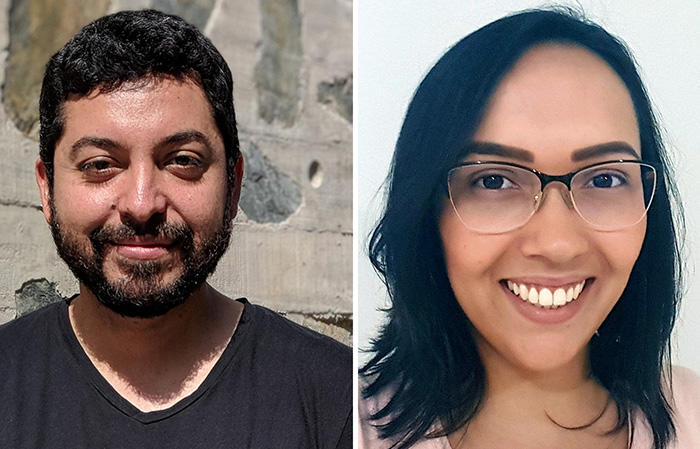July 26, 2019
Eighty students and researchers from developing nations awarded UCalgary travel grants to attend biomechanics conference

Mauricio Delgado and Karine Stoelben
This will be Mauricio Delgado’s first trip to Canada. The assistant professor will trek more than 10,000 kilometres to attend an international biomechanics conference in Calgary with three of his undergraduate students thanks to a travel grant.
“This trip will be a fantastic experience for my students and for me: to see old friends, and make new friends too,” says Delgado, referring to the Kinesiology-led XXVII Congress of the International Society of Biomechanics and the 43rd Annual Meeting of the American Society of Biomechanics, taking place in Calgary in late July and early August and is expected to have more than 2,000 people in attendance.
- Photo above: Mauricio Delgado, left, is a scientist and a physiotherapist who works at the Pontificia Catholic University of Chile’s Faculty of Medicine. He is bringing three of his undergraduate students to the international biomechanics conference. Karine Stoelben, PhD candidate at the Federal University of Pampa in Brazil, says the conference travel grant helps improve her research and opens up opportunities for training and employment. Photos courtesy Mauricio Delgado and Karine Stoelben
“This congress is important, because it lets me show the research community my work,” says Delgado, a scientist and a physiotherapist who works at the Pontificia Catholic University of Chile’s Faculty of Medicine.
Delgado, 36, is among more than 80 international participants who will be attending the biomechanics conference in Calgary because of a travel grant funded by key sponsors and various University of Calgary faculties. This grant allowed students and academics from developing nations to attend this year’s event with reduced registration fees rates and/or accommodation support.
“I am tremendously grateful that the university is supporting this cause which will help many students and, most importantly, it sets a precedent for future conferences to do a similar thing,” says conference chair Dr. Walter Herzog, PhD.
Travel grant supports those in economically developing countries
The majority of the international participants from economically developing countries “would not be attending the conference if not for this support,” says congress event director, Sandro Nigg.
Despite the financial barriers for students and researchers from economically developing countries, they have made substantial contributions not only to the science of biomechanics but also to the profession, by serving on international committees, hosting conferences and participating in exchange programs, thereby becoming an important and integral part of the biomechanics community.
“I think that the opportunity for students from economically developing countries to meet international researchers is a great way to increase the quality of research in EDC countries, and to collaborate and visit other laboratories around the world,” says Karine Stoelben, 27, who will also be attending the conference. Stoelben, a PhD candidate in physiology in the Applied Neuromechanics Research Group, Federal University of Pampa in Brazil, researches knee injury prevention.
While in Calgary, Stoelben and Delgado are eager to visit the Faculty of Kinesiology’s renowned Human Performance Lab, which has led research in running injury biomechanics over the past few decades, and more recently in sports injury prevention. Established in 1981, the Human Performance Lab was set up to do interdisciplinary research, a concept that was then copied by others around the world.
Researching future opportunities
“The conference grant is an excellent incentive to improve my research. The conference opens up opportunities for training and employment — this will impact my career in a good way,” says Stoelben.
Delgado will explore the possibility of doing a PhD at the University of Calgary under the supervision of UCalgary kinesiology professor Dr. Herzog, who helped Delgado and others create the Human Science Movement Association of Chile, and was the lead keynote speaker at the association’s first congress in 2016. “Research in clinical biomechanics in physical therapy and rehabilitation are really new in Chile — we need more PhD programs and more people, because it is the people who create the labs,” says Delgado.



